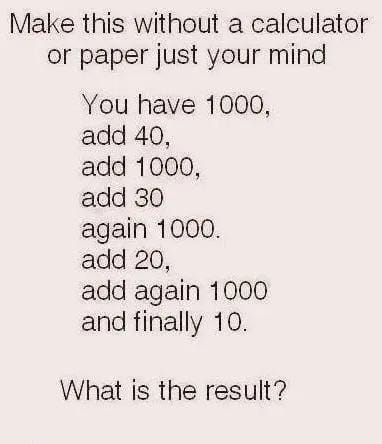Have you ever pondered the incredible potential of your mind? Our brains are truly remarkable, performing tasks and calculations with ease. However, it’s all too common to reach for a calculator for even the simplest math tasks. Today, we’re introducing a fascinating puzzle that encourages you to rely purely on your mental abilities.
The Puzzle
This challenge is straightforward but can trip up even the most seasoned problem-solvers. Here it is: Start with 1000. Add 40. Add 1000. Add 30. Add another 1000. Add 20. Add a final 1000. Finally, add 10. When people rush through this exercise, they often total it up to 5000. However, the actual answer is 4100. This common error is due to our brains processing information rapidly, sometimes missing the finer details. Let’s break it down to see where the mistake happens.
Breaking Down the Calculation
Let’s take this calculation step-by-step to ensure accuracy:
Starting point: 1000
Add 40: 1000 + 40 = 1040
Add 1000: 1040 + 1000 = 2040
Add 30: 2040 + 30 = 2070
Add another 1000: 2070 + 1000 = 3070
Add 20: 3070 + 20 = 3090
Add a final 1000: 3090 + 1000 = 4090
Finally, add 10: 4090 + 10 = 4100
The correct answer is 4100. Simple, isn’t it? But why do so many people think it totals 5000?
Why Our Brain is Tricked
This puzzle is a perfect illustration of how cognitive shortcuts can mislead us. When we do quick calculations, our brains tend to group numbers, leading to errors. Often, people register the sum of all the 1000s, which is 4000, then quickly add 40, 30, 20, and 10, mistakenly arriving at 5000. This confusion is a result of processing smaller numbers too rapidly, sometimes combining them inaccurately. This is known as cognitive overload, where trying to juggle too much information leads us to rely on assumptions rather than precise calculations. Mistakes become more likely as we add more numbers.
Strengthening Your Mental Math
Now that you understand how your brain can lead you astray, it’s time to improve your mental math. Avoid similar mistakes by breaking down calculations into smaller steps and double-checking each stage. Here are some tips:
Visualize the Numbers: Try to visualize each step as if writing it down, rather than rushing through. This helps keep track of totals and avoids errors.
Practice with Smaller Numbers: Start small and build up. Training with smaller sums enhances your ability to handle larger numbers accurately.
Stay Calm: Cognitive overload often occurs when solving problems too quickly. Take a deep breath, slow down, and tackle challenges with patience.
Use Estimation: When precision isn’t crucial, estimation can be helpful. However, with puzzles like this, precision is essential, so approach it methodically.
Practice Regularly: Like any skill, mental math improves with practice. Regularly engage with puzzles and problems, and you’ll soon see your accuracy improve.
The Importance of Keeping Your Brain Sharp
Just as physical exercise maintains our bodies, mental challenges keep our minds engaged. Tackling puzzles like this one strengthens cognitive function, enhances concentration, and boosts problem-solving abilities. Regular mental workouts can also lower the risk of cognitive decline with age. In a world increasingly reliant on technology for thinking, it’s refreshing to take a moment to let your mind do the calculations. The next time you reach for a calculator, consider giving your brain the opportunity to shine.
Conclusion
The mental math challenge offered here is more than a simple exercise. It’s a reminder of your mind’s capabilities. While using a calculator is easy, problem-solving mentally is beneficial for maintaining cognitive sharpness. If you were tricked into the 5000-answer error, don’t worry—you’re not alone! Remember to slow down, visualize, and tackle tasks step by step. You’ll not only arrive at the right answer but give your brain a beneficial workout.




